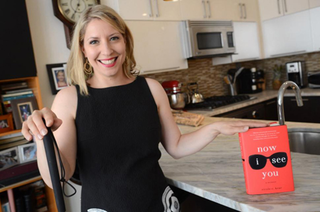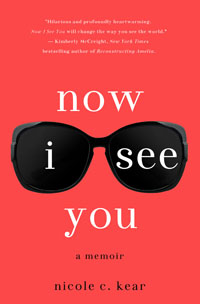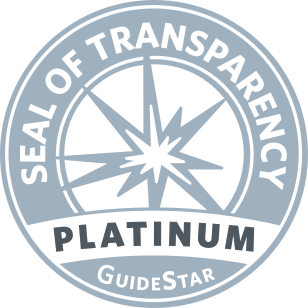Lighting a Candle: The Author of a New Memoir Shares the Highs and Lows of Vision Loss
Beacon Stories
Nicole Simpson, author of “Now I See You,” shares her experience with retinitis pigmentosa.
By Nicole C. Kear

Nicole C. Kear, author of the memoir Now I See You.
I was 19 years old when I found out I was losing my vision as a result of a retinal disease called retinitis pigmentosa. Halfway through college, I was perched between girlhood and adulthood; I was developing my adult sense of self, planning what my grown-up life would look like. The news that I would slowly go blind changed everything.
As my new memoir, Now I See You, attests, it didn’t change everything for the worse, but at 19, I didn’t clearly understand this. I didn’t clearly understand much of anything, really, that summer; everything was tinted with a glaze of fear and foreboding, obscured with the haze of confusion. The doctor who diagnosed me explained that I might end up what he called “legally” blind, or possibly more blind that that.
Besides being terror-inducing, this was also bewildering. I’d had no idea there were different varieties of blind. In my very limited experience, people either had vision or they didn’t. If I ended up blind—legally or otherwise—how would that affect my life? Could I have children? Could I wear makeup? Would I be able to support myself?
Every question gave rise to a dozen more. The whole thing made me feel enormously demoralized.
I considered the two facts that were more-or-less certain:
1. I would lose my vision.
2. I still had vision now.
In light of this, the smart thing to do, I concluded, was to make the most of my vision, while I had it. An added benefit of this strategy was that by taking on grand adventures, traveling the world and throwing myself into exciting romances, I wouldn’t have to think about my eye disease and the million disquieting questions it raised.
My parents had discovered the Foundation Fighting Blindness a few weeks after my diagnosis and become involved immediately. My mother attended VISIONS, FFB’s annual conference, and came back with names of specialists, titles of books and phone numbers of people to meet, including other young women who had RP and were living full lives.
My aunt threw herself into fundraising efforts. My grandmother prayed. And my father, a doctor, hit his medical books in an attempt to understand my disease and possible treatments. I kept myself at a safe distance from all these coping strategies, having found a very effective one myself, which was Cross That Bridge When I Come To It.

I used my remaining vision to do the things I loved—reading, acting in plays, traveling. Later, that involved taking in the sight of the man I loved and would marry, and soaking in every detail of the three children whom I treasure more than anything. It was vision well spent.
But the problem with not preparing for the inevitable is, when the inevitable comes, you’re not prepared. My field of vision shrank; I developed color blindness, lost depth perception; I developed cataracts. I was declared legally blind and registered with the New York State Commission for the Blind, which provided me with services like cane training and adaptive technology instruction. I was, very belatedly, building an effective coping strategy, but I was still missing something critical, and that was emotional support.
Finally, I summoned the courage to attend a local meeting of my Foundation Fighting Blindness networking group. At first, I was terrified; there were blind people there, fully blind folks, with canes and guide dogs. It was what I’d spent nearly 15 years running from. But then they started talking about the challenges they faced, their fears and hopes, and it sounded so familiar. So much of what they were voicing is what I’d struggled with over the years. All this time, I’d thought I was the only one.
Had I never become involved again with FFB, I don’t think I would have been able to write my memoir, Now I See You, which is out this week. Over the past few weeks, I’ve heard from countless individuals whose lives are affected by vision loss, and reading and responding to their messages has been one of the most gratifying experiences of my life, second only to raising my children.
I don’t know why knowing you’re not alone in your struggles makes those struggles easier to bear, but it does. My book begins with an ancient proverb: “It is better to light a candle than curse the darkness.” It’s exactly what the Foundation Fighting Blindness has done in my life; it’s lit a candle.




